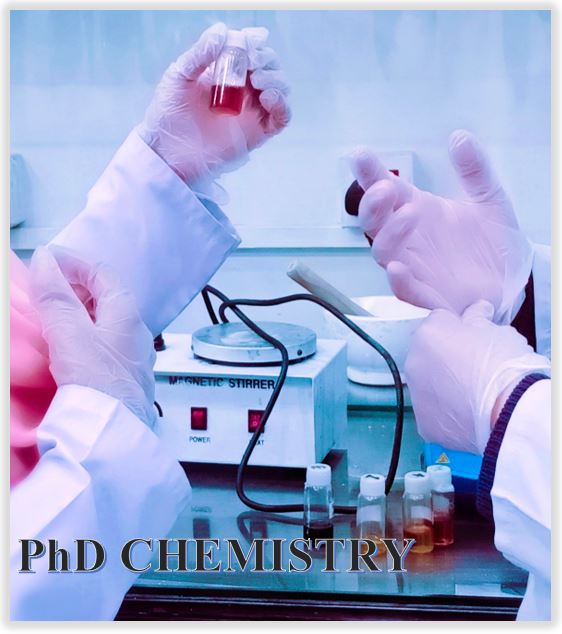Ph.D. in Chemistry: Introduction, Admission, Registration, Eligibility, Duration, Fees, Syllabus 2024

Introduction:
Chemistry, often termed as the “central science,” is pivotal in bridging the physical sciences with life sciences and applied sciences. A Ph.D. in Chemistry is a profound commitment to understanding the subtleties of matter and its myriad interactions. It’s a path that promises not just a degree but a lifetime of exploration and discovery.
Admission Process:
- Application: Submission of a detailed application with academic transcripts, personal statements, and letters of recommendation.
- Examinations: GRE general and subject-specific tests may be required.
- Interview: Personal or virtual interviews to gauge the candidate’s passion and understanding of chemistry.
- Research Proposal: Presentation of a research proposal that outlines potential areas of study.
Eligibility:
- Master’s Degree: In chemistry or a closely related field with a strong academic record.
- Research Experience: Demonstrated experience in research, whether through projects, internships, or publications.
- Academic Prerequisites: Completion of foundational courses in organic, inorganic, physical, and analytical chemistry.
- Letters of Recommendation: Strong recommendations from academic or professional mentors.
- Personal Statement: A compelling narrative of the candidate’s journey and aspirations in chemistry.
- Standardized Tests: Good scores in GRE or equivalent examinations, if applicable.
Completion Time:
The journey to a Ph.D. in Chemistry typically spans 4 to 6 years, including coursework, comprehensive exams, research, and dissertation defense.
Career Opportunities:
- Academic Researcher: Lead innovative research projects and teach the next generation of chemists.
- Industrial Chemist: Develop new products and processes in sectors like pharmaceuticals, materials, or energy.
- Government Scientist: Influence policy and conduct research in national laboratories.
- Consultancy: Provide expert analysis and advice on complex chemical issues.
- Entrepreneurship: Launch startups focused on chemical innovations.
- Science Communication: Bridge the gap between complex chemistry concepts and public understanding.
Syllabus:
- Advanced Organic Chemistry: Delving into the mechanisms and synthesis of organic compounds.
- Physical Chemistry: Understanding the principles that govern the behavior of matter.
- Analytical Techniques: Mastery of methods for analyzing and quantifying chemical substances.
- Inorganic Chemistry: Exploring the chemistry of metals and non-metals.
- Chemical Kinetics: Studying the rates of chemical reactions.
- Computational Chemistry: Using computer simulations to solve chemical problems.
Internship Opportunities:
- Pharmaceuticals: Hands-on experience in drug discovery and development.
- Environmental Agencies: Researching chemical solutions to environmental challenges.
- Material Science: Innovating in the creation of new materials with unique properties.
- Energy Sector: Developing sustainable chemical processes for energy production.
- Forensics: Applying chemical knowledge in criminal investigations.
- Education: Teaching and inspiring future generations in schools or public outreach programs.
Scholarships and Grants:
- Research Fellowships: Financial support for promising research proposals.
- Teaching Assistantships: Funding in exchange for teaching responsibilities.
- Industry-Sponsored Awards: Scholarships provided by companies invested in chemical research.
- Travel Grants: Assistance for attending international conferences and seminars.
- Government Scholarships: Public funds for research in areas of national interest.
- International Fellowships: Opportunities to conduct research abroad.
FAQs:
What sets a Ph.D. in Chemistry apart from other science doctorates?
A Ph.D. in Chemistry is distinguished by its focus on the molecular and atomic level of physical reality, with applications across a vast array of industries.
Can I specialize within the field of chemistry?
Yes, specializations are available in areas such as organic, inorganic, physical, analytical, and biochemistry.
What are the prerequisites for successful research in chemistry?
A strong foundation in various chemistry disciplines, analytical skills, and a creative approach to problem-solving.
Is collaborative research common in a Ph.D. in Chemistry?
Absolutely, interdisciplinary collaboration is key to solving complex research questions.
What are the prospects for Ph.D. chemists in the job market?
The job market is diverse, with opportunities in academia, industry, government, and beyond.
